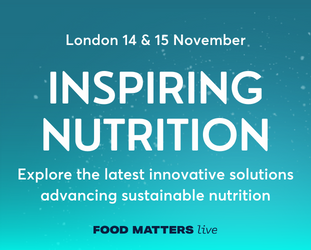What is protein? We reveal the secrets of protein with Dr Richard MacKenzie

Everyone seems to be concerned with their (and other people’s) intake of protein these days, and food companies have taken notice, launching a large variety of protein-enriched products on the market. So, we’ve asked the question “what is protein?” This article delves into whether consumers are overly concerned about protein consumption, and if they are, perhaps, eating too much of it. Dr Richard MacKenzie sheds light on the truth behind some common misconceptions about dietary protein, and its function and impact on our bodies.
What is protein made of, and what is it needed for?
Protein is a fascinating nutrient that seemingly has an endless number of uses within the body and across the food industry as a whole. From animal products (meats and dairy) to plant-based proteins like nuts and seeds as well as biscuits and popular chocolate bars, protein is absolutely everywhere – but the world of truth to its health claims can be a murky one at that.
Many of the world’s claims about the magical nutrient that is protein certainly seem ambiguous, they surely can’t all be true. So, to truly begin to understand protein, we have to ask the question “what is protein, and why do we need it?”
Protein as a nutrient is made up of smaller molecules known as amino acids. From the moment we ingest protein, our bodies break it down into these amino acids – using this as the building blocks of ourselves to build, repair, and grow muscle.
What is the function of protein, and what is it used for?
While protein does go towards other processes in our bodies, once absorbed, the majority of the protein we consume and absorb will make its way across to muscle groups. It is either stored as actual muscle or it will be in the intracellular compartment, which is essentially a pool of readily available protein to make new muscle.
So, what is protein used for? The amino acids in protein are greatly important to the generation and repair of muscle, and your overall health – and these nutrients have been shown to be greatly beneficial for the repair and generation of new muscle. For example, most of our bicep muscles will be able to replace themselves in their entirety in as little as two weeks.
Is all protein the same? Tracking protein and amino acids
Interestingly enough, all proteins are indeed the same – which makes the study of protein a difficult one. However, not all amino acids are the same; there’s a big difference between essential and non-essential amino acids and how they metabolise.
According to Dr Richard MacKenzie, the Research Director for the Sport & Exercise Science Research Group at Roehampton University, the tagging of amino acids in the body can help us to understand the function of each type.
“We [have] tagged amino acids [and] when we put them into the body, they can feed and we can feed them; [allowing us to] follow that particular amino acid around [the] metabolism.
One example is we would then take blood, muscle, [and] tissue samples to see how much of that particular amino acid has been incorporated into the muscle. Then we can test things like, if we take ‘X’ supplement, does it actually do what it says on the tin? Does it improve or increase muscle protein synthesis? Because we know directly that [this particular] tagged amino acid is being incorporated into the muscle, and what rate that happens.”
So, how exactly is protein-tagged in the body? Dr MacKenzie states that it’s like looking at a fluorescent tag underneath a scan, and this can be used to track where, and how much, protein and amino acids have accumulated in certain parts of the body.
“Protein is the largest structure and we can tag the particular amino acid [it is linked to]. Try and visualise it [as a] fluorescent tag that you might look at underneath a scan… When we get the sample at the end, we can look at the ratio of the untagged versus the tagged amino acid [in muscle groups]. From that, we can work out how much has been incorporated into muscle.”
What is protein good for? How much protein should you be consuming?
Various sources, including the NHS, state that the average person consuming 2000 calories a day should be consuming 50 grams of protein per day. Additionally, the recommended daily allowance, or the RTA, is around 1 grams per kilogram of body mass.
So, for the average male, it might be 64g. And that’s for the average person consuming a typical diet, not exercising too much, and with no underlying health concerns.
Does the time of day that we’re eating protein affect how much protein we absorb? According to Dr MacKenzie, the best time to consume a protein-rich meal is during our final meal of the day.
“The end of the day is probably the time where you could [benefit most] from having the biggest protein load. So, if you were looking at timings, the suggestion would be around three grams per kilogram per meal of protein, whatever that meal is. [However, some sources are] recommending it at the end of the day, but at 2.5 grams per kilogram per meal.”
What are quality sources of protein?
As previously mentioned, all protein is the same. What an interesting revelation. But what truly distinguishes sources of protein apart are the vessels dietary proteins are contained in, and whether this vessel is nutrient-dense or not.
Naturally, a better quality source of protein will contain more amino acids – Dr MacKenzie states that processed vegan sources of protein are just as bad as processed meat sources and that it would be better for you in terms of consuming a quality source of protein to get it from a sustainable local source; even if it is meat.
“I went to a barbecue when I was lucky enough to get out of lockdown. And, increasingly, there are more vegetarians and more vegans .. and I’m all in agreement with that. Probably what I’m less in agreement with is that the protein sources from a vegan source should be in diet tofu or salad or something of that nature.
What they’re doing [at the barbecue] is [rather than] flipping up the sort of processed meat burger, they’re exchanging it for a processed vegetarian burger. And that’s what I mean, that doesn’t mean that’s a good protein source, and you’d be better off getting your protein from a sustainable local source, even if it is meat rather than a processed source.”
What is good about protein when it comes to weight loss?
There seems to be a common misconception that a high-protein diet is a huge factor when it comes to losing weight and weight gain. Is this true? Although there’s no one-answer-fits-all solution to weight loss, there’s a whole range of factors that contribute.
“There’s no one answer to weight loss. There are lots of things that go into why people are overweight, and the environment that we live in is one of the major problems. It surprises me that there aren’t more overweight people, given how we live our lives, but it does have lots of good potential benefits for weight loss. I believe on a whole-body level, it’s marginal. It can easily be offset by the wrong kind of diet or lifestyle.”
Dr MacKenzie also states that there may even be an upper limit where the benefits from the number of dietary proteins you consume happen to plateau – meaning that, by consuming more protein, you aren’t going to gain any more benefits than consuming around the upper limit.
“What we do know from different ages and different populations is that anything above two grams of protein per kilogram body mass will not award you any more benefits than less. So if you consume three grams, for example, it’s not going to give you any more benefit than two grams. There’s a threshold number of people that would benefit from more so older individuals benefit from having more protein, so their threshold for muscle protein synthesis has point three nine grams per kilogram of body mass versus a younger individual, which is 3.25 grams per kilogram of body mass. So, there’s definitely populations where people would benefit, but there is an upper limit.”
What is the benefit of protein for athletes?
Protein is often touted as the number one go-to nutrient for athletes but, as we learned above, there seems to be a point where the benefits of a high protein intake do not continue. So, what are the benefits of protein for athletes? Does protein supplementation with shakes and other sources have additional benefits if you’re an elite athlete?
Dr MacKenzie argues that although protein shakes and protein supplements are useless for most normal athletes, if you’re competing in a high-intensity sport where the calorie expenditure is particularly high, supplementing with protein could not only become useful, but it may also provide the necessary amino acids for a faster rate of muscle repair and replacement.
“I’d say protein shakes are useless for most, including elite athletes because they get what they need from their diet. There is enough protein there, as they are working with nutritionists in their diet. Now, there are some Tour de France cyclists, for example, who may consume or need to consume [further sources of protein] because they’re expending 9,000 calories per day some days; so there may be an instance where that kind of supplement becomes useful.
It also depends on the sport. So amino acids for Tour de France cyclists would be just for muscle repair, growth, and preparation because they’re not really going to rely on amino acids for energy. Whereas, you know, rugby players’ amino acid intake will be slightly higher than an endurance athlete; but their requirements for the energy needed are going to be slightly different.
It does make a huge difference in the period after for how well their muscles repair. The recovery from the sporting event or from training is very important – even when just trying to get enough protein in their body so that they can repair and actually keep some of the muscle mass they started with.”









